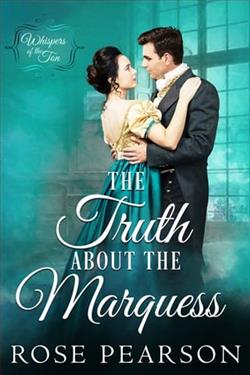Martial Peak Reviews
Rose Pearson's The Truth about the Marquess is a delightful Regency romance that deftly combines the charm of anonymous correspondence with the complexities of societal expectations and personal desires. The novel's premise, centered around a widowed advice columnist and an unwitting marquess, offers a fresh take on the traditional romance narrative, providing readers with a story that is both engaging and thought-provoking.
At the heart of the novel is Lady Jane Harsham, a character whose depth and resilience make her an instantly relatable protagonist. Having been married to a much older gentleman, Jane finds herself navigating the intricacies of society as a widow. Her decision to become an advice columnist for The London Chronicle is not just a means of financial security but also an avenue for self-expression and empowerment. Pearson skillfully portrays Jane's journey from a woman constrained by societal norms to one who finds her voice and agency through her writing. This transformation is both subtle and profound, highlighting the theme of self-discovery that runs throughout the novel.
On the other side of the correspondence is Timothy, the Marquess of Edenbridge. His character is a refreshing departure from the typical brooding aristocrat often found in Regency romances. Instead, Timothy is portrayed as a man genuinely seeking a marriage based on affection rather than obligation. His vulnerability and sincerity in his letters to the advice column reveal a depth of character that is both endearing and relatable. Pearson's portrayal of Timothy's internal struggle between societal expectations and personal desires adds a layer of complexity to the narrative, making his journey towards love and self-acceptance all the more compelling.
The anonymous letters exchanged between Jane and Timothy serve as a powerful narrative device, allowing both characters to explore their innermost thoughts and feelings without the constraints of societal judgment. This anonymity fosters a sense of intimacy and honesty that is often lacking in their public interactions. The letters become a safe space for both characters to express their fears, hopes, and desires, ultimately leading to a deeper understanding of themselves and each other. Pearson's use of this epistolary element not only drives the plot forward but also enriches the emotional depth of the story.
One of the novel's standout themes is the exploration of love and marriage in the context of societal expectations. Pearson delves into the pressures faced by both men and women in Regency society, where marriage is often seen as a transaction rather than a union of hearts. Through Jane and Timothy's journey, the novel challenges these conventions, advocating for a love that is based on mutual respect and understanding. This theme is particularly resonant in today's world, where the quest for authentic connections remains a universal pursuit.
In terms of character development, Pearson excels in crafting multidimensional characters who evolve over the course of the narrative. Jane's transformation from a woman defined by her past to one who embraces her future is both believable and inspiring. Similarly, Timothy's journey towards self-awareness and emotional honesty is portrayed with sensitivity and nuance. The supporting characters, though not as prominently featured, add depth and texture to the story, providing a rich backdrop against which the main narrative unfolds.
The novel's pacing is well-balanced, with a seamless blend of introspective moments and engaging dialogue. Pearson's writing style is elegant and evocative, capturing the essence of the Regency era while infusing the narrative with a modern sensibility. Her attention to detail in depicting the social customs and settings of the time adds authenticity to the story, immersing readers in the world she has created.
Comparatively, The Truth about the Marquess shares thematic similarities with other works in the Regency romance genre, such as Julia Quinn's Bridgerton series and Mary Balogh's Survivor's Club series. Like Quinn and Balogh, Pearson explores the tension between societal expectations and personal desires, crafting a narrative that is both entertaining and thought-provoking. However, Pearson's unique approach to storytelling, particularly through the use of anonymous correspondence, sets her work apart, offering readers a fresh perspective on the genre.
Overall, The Truth about the Marquess is a captivating and heartwarming tale that will resonate with fans of historical romance. Rose Pearson's skillful blend of engaging characters, compelling themes, and evocative writing makes this novel a standout addition to the genre. Whether you're a longtime fan of Regency romance or new to the genre, this book promises a delightful and rewarding reading experience.
In conclusion, The Truth about the Marquess is more than just a love story; it is a celebration of self-discovery, authenticity, and the transformative power of love. Pearson's ability to weave these themes into a narrative that is both entertaining and meaningful is a testament to her talent as a storyteller. This novel is sure to leave a lasting impression on readers, inviting them to reflect on their own journeys towards love and self-acceptance.
























Reviews 0
Post a Reviews: